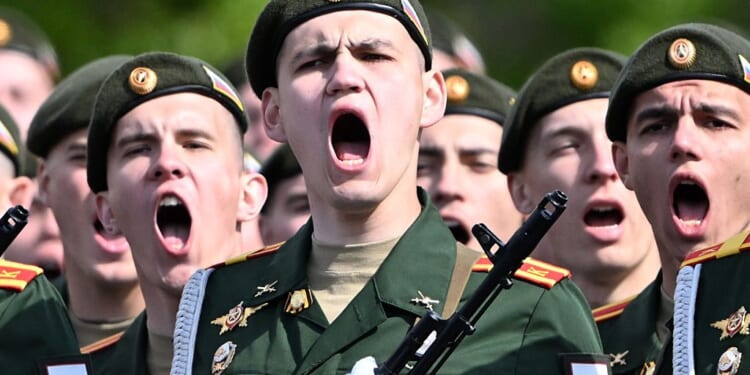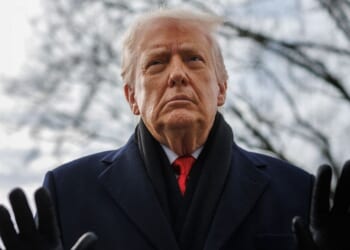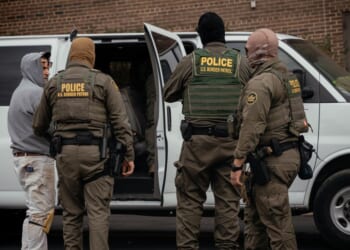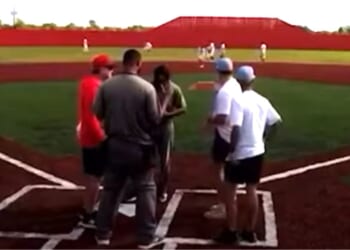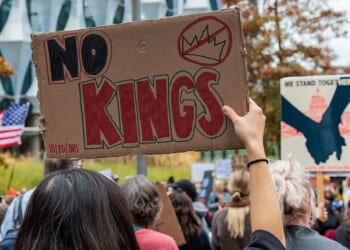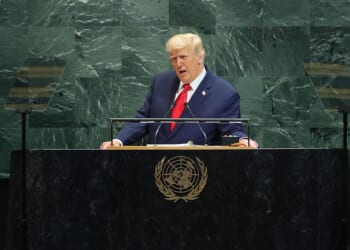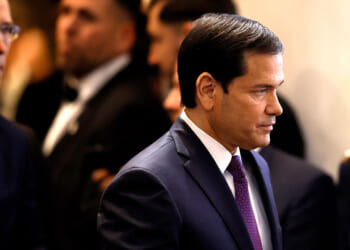This summer, Russian soldier Sergei Moskalenko absconded from his unit at the frontline in Ukraine. Slipping past the military authorities, Moskalenko made it home to Chelyabinsk, a dilapidated industrial city in the remote Urals, where his wife and two children were waiting for him. Within days, he had violently murdered his wife at home.
The road from contract soldier to violent criminal has become all too familiar in Russia in recent years. At least 500 civilians have been killed or seriously injured by returning veterans since the full-scale invasion of Ukraine in 2022, and the tide of violence shows no signs of slowing.
Tune into the state’s propaganda channels, however, and a different picture emerges. On 31 December 2024, a handful of “Special Military Operation” veterans in immaculately pressed uniforms were feted as heroes at Goluboi Ogonek, Russia’s glitzy televised New Year’s light festival, alongside the usual cavalcade of pop stars and celebrities. They sang the praises of their government, their country’s war, and their comrades-in-arms.
Similarly glittering visions of soldiers, hymned as the saints of the Kremlin’s cult of war, are plastered over Russian state-owned media. The image of ordinary soldiers returning from the front, flush with cash, to acclaim and accolades is everywhere in popular culture. Billboards with the faces of the “Heroes of Russia” sprawl across highway bridges and loom over city streets throughout the land. The Russian Orthodox patriarch sings the praises of veterans from the pulpit, claiming that to die in Ukraine “washes away all sins”.
On top of this choreographed public zeal is a deluge of advertising that promises up to $60,000 (USD) to those who enlist and survive a year as a kontraktnik, a contract soldier. The adverts promise Russian men that they can be rich and successful — which, stuck in the underdeveloped, stagnant regions outside wealthy cities, most ordinary Russians cannot otherwise hope to be. And it’s not just talk: as much as 1.5% of Russia’s GDP is being spent on these bonuses. The mostly uneducated men who seize the chance and survive their year in the “meat grinder”, which has left hundreds of thousands of Russian men dead in Ukraine, brag on social media about the cash lining their pockets. Yet there is nothing to brag about during their time at the front, where they are initiated into Russia’s particularly brutal way of warfare which embraces violence, torture, rape, and the murder of combatants and civilians alike.
Russian soldiers are promised the very best treatment on their return from war. The Kremlin has created a special “Defenders of the Fatherland” foundation, led by Vladimir Putin’s cousin Anna Tsivileva, to advocate for veterans. State-run groups on VK and Telegram — two of the country’s most popular social media platforms — run Q&A sessions for those seeking to maximise the new benefits the Kremlin is supposedly offering, which include access to family and child support, employment opportunities, and healthcare. The media explains how soldiers and their families can access free trips to luxurious recuperation sanatoria; meanwhile, the wounded are supposedly cared for at hyper-modern rehabilitation clinics. In reality, such benefits are available only for the lucky few who can navigate their way through Russia’s arcane veterans bureaucracy.
Behind the Kremlin-orchestrated spectacle, however, lurks an angry, violent group of veterans. The state deliberately leaves its demobbed troops in a perpetual battle mode, firing them up with social and mainstream media campaigns that promise that, since Russia is surrounded by enemies at home and abroad, the battle is never over. Men who have killed for the state are told that they may have to fight again to defend their meagre gains. Those who return home are thus often left unrecognisable. As one wife commented on social media: “My husband returned home from the war. But this isn’t my husband, he’s not the man I knew before. Sometimes it feels like he was killed. His body came back, but not his soul. He’s become irritable. Everything angers him. Me, the kids, and everyone around him.” All over the country, Russia’s ex-soldiers seem incapable of interacting within a peaceful civilian milieu.
“Russia’s ex-soldiers seem incapable of interacting within a peaceful civilian milieu.”
Meanwhile, murder after murder hit the headlines. A veteran beats his friend to death with a chair; another stabs his ex-girlfriend to death while her daughter watches; a Chechen man is butchered at a bus stop. These stories don’t receive much coverage in the Russian media, even as the violence conducted by ex-soldiers let loose on civilian society spreads. Serious crimes are punished with heavy jail terms, but the spiralling cases of domestic violence result in fines as small as $55 — pocket change for men who have made thousands of dollars by fighting in Ukraine. There is little real justice, and the state barely pretends to care.
When soldiers are demobbed from modern Western armed forces, they are offered psychological and reintegration support to help them leave their identity as soldiers — as killers — behind. But in Russia, no widespread programmes exist for the hundreds of thousands of men Putin has sent to fight in Ukraine. The few rehabilitation centres that do exist are overwhelmed and poorly equipped to treat deep psychological trauma. And for those who develop post-traumatic stress disorder (PTSD) — a diagnosis barely even acknowledged in official media — help is scarce and stigmatised. After all, the state has no intention of transitioning these soldiers away from the violence of war — and that violence continues to offer plenty of rewards.
Problems are glossed over in the stilted bureaucratic language of the administrative state: “We have faced a shortage of rehabilitation institutions with highly qualified personnel,” explained one official this summer — but now the problem is “solved”. Wives are expected to support their husbands instead of psychiatrists, reinforcing the state’s strict gender rules about women’s roles as supporters of male violence. Yet even the Kremlin does not pay more than lip service to the idea of instructing women on how to stem the rising tide of violence. One Moscow psychologist running a private practice told me they have treated a handful of former soldiers, but have been contacted by many more distraught wives — terrified of and for the men who came back from the front.
To those familiar with Russia’s history, this might seem par for the course. Over the past century, Russia has embroiled itself in vast wars that have left millions of men and women engulfed in post-traumatic nightmares when the guns have gone quiet. At times, this has tipped the country into outright chaos: would the Civil War have seen a wave of unfathomable brutality sweep across the country, resulting in at least eight million casualties, had the Eastern Front of the First World War not been so violent? Would post-Soviet Russia have been so dominated by criminal thuggery had a generation of young men not been sent to fight in Afghanistan, then welcomed home with a shrug as the USSR collapsed? Would the nihilism of the late Nineties, before Putin swept to power on promises of masculine and national renewal, have been so acute if Boris Yeltsin hadn’t sent a generation of conscripts into a conflict in Chechnya?
Each time Moscow sends its young to kill and be killed, it promises personal and collective triumph but delivers disillusionment. As one veteran of the Afghan war explained in Nobel prizewinner Svetlana Alexievich’s seminal study of those who had returned from that conflict, Zinky Boys: “I wanted to be in a war, but not like this one. Heroic World War 2, that’s what I wanted.” Successive regimes have seemed determined to treat the mass of their soldiers as human capital more than as heroes. These angry bands of ex-soldiers have plagued the Kremlin’s incumbents with criminality, opposition and uprisings.
It might, therefore, appear that Putin is repeating the mistakes of the Eighties and Nineties as he foments another generation of angry soldiers who behave as brutally at home as they did at the front. But the state has done little to stymie what is an obvious problem. Instead, it almost seems to encourage it as a means to keep the entire population on edge, ready to engage in what the Kremlin claims is an endless war against enemies that are out to destroy Russia.
Putin has chosen to pursue a particularly bloody form of warfare in which soldiers are rewarded for committing violent atrocities. When they return home, the Kremlin’s soldiers are in turn offered opportunities to act as its agents of violence by enrolling in the domestic security services, taking up positions of power in the war economy, and advocating for further conflict. This is the approach Putin took in the 2000s, when he offered the disillusioned and criminal veterans of Afghanistan and Chechnya paths into the hierarchy of power as municipal police, security agents, mayors, governors, and even Duma deputies as a means to placate them. Now he is repeating the trick at a far larger scale.
These violent men do not represent a threat to Putin’s regime; in fact, they are key to upholding it. The Kremlin has put the country on a constant war footing, ensuring it is always ready to fight the next battle, which leaves it with little incentive to aid veterans. It thus pretends to help ex-soldiers while counting on those embittered and psychologically broken men to keep Russian society enveloped in a cycle of conflict and repression that Vladimir Putin’s allies claim is essential to the nation’s survival (and, of course, to their own hold on power). The soldier who lives by violence may prove necessary to an increasingly draconian regime that is struggling with a faltering economy, spiralling inflation, and a lacklustre war effort. After all, history tells us that oppression at home and conflicts abroad will be far more easily waged by bands of men who are psychologically traumatised by war and convinced that violence is simply part and parcel of political life.
Meanwhile, back in Chelyabinsk, Sergei Moskalenko is awaiting trial for the murder of his wife. Should he be convicted, he may not languish long in jail. Almost 200,000 Russian prisoners have already enlisted to, as the Red Army’s propagandists in the Second World War christened it, “atone for their crimes by blood”: to fight in return for their freedom. Moskalenko, in this case, may be back at the front within months — free to abscond, free to serve out his time, and free to return home, just as full of violence as when he left.

